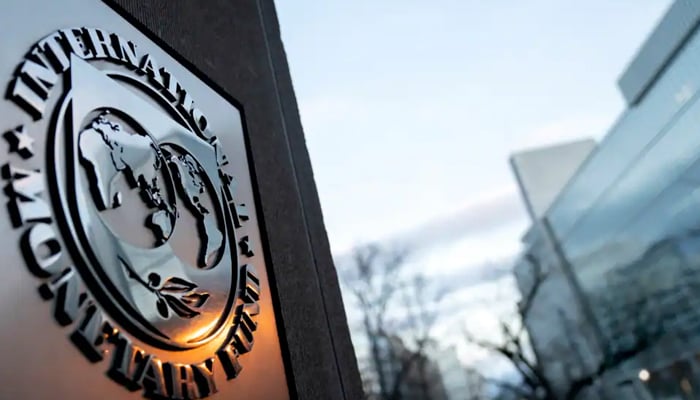IMF board green-lights $3 billion SBA for Pakistan
IMF approves short-term deal to “support the authorities’ economic stabilisation programme”
The International Monetary Fund (IMF) Executive Board on Wednesday approved a staff-level agreement reached with Pakistan on a short-term stand-by deal.
“Today, the Executive Board of the International Monetary Fund (IMF) approved a 9-month Stand-By Arrangement (SBA) for Pakistan for an amount of SDR2,250 million (about $3 billion, or 111 percent of quota) to support the authorities’ economic stabilization program,” the global lender said in a statement.
The development comes hours after Finance Minister Ishaq Dar said that Pakistan received $1 billion from the United Arab Emirates (UAE) as part of its financial commitment to help Pakistan secure the International Monetary Fund (IMF) bailout package.
"We have received $1 billion from the UAE. The UAE has deposited the amount into the State Bank account," the financial czar announced in a televised media address on Wednesday.
A day earlier, the finance minister said Saudi Arabia deposited $2 billion in the SBP account to help the boost the country foreign reserves and fulfill the global lender’s condition to bridge external financing gap.
Islamabad signed a short-term IMF deal on June 30 under which the country will receive $3 billion over nine months, subject to approval by the IMF's board.
The Executive Board’s approval allows for an immediate disbursement of SDR894 million (or about US$1.2 billion), the IMF said in the statement today.
The remaining amount will be phased over the programme's duration, subject to two quarterly reviews, it added.
The IMF said the SBA was signed at a “challenging economic juncture for Pakistan”.
“A difficult external environment, devastating floods, and policy missteps have led to large fiscal and external deficits, rising inflation, and eroded reserve buffers in FY23,” it added.
Pakistan’s new SBA-supported programme, the IMF said will provide a policy anchor for addressing domestic and external imbalances and a framework for financial support from multilateral and bilateral partners.
Following months of delays, Pakistan secured the bailout package after taking tough economic measures including increasing interest rates and raising taxes to meet IMF conditions.
After the IMF staff-level agreement, Fitch credit rating agency Monday — after almost a year — upgraded Pakistan's long-term foreign currency issuer default rating to CCC from CCC-.
Pakistan has $25 billion of debt repayments due in the fiscal year starting July, according to Moody’s Investors Service. That’s more than five times its foreign-exchange reserves, which stood at $4.5 billion at the end of June.
The IMF deal will unlock billions of dollars from nations and other multilateral lenders.
In the plan sent to the lender, sources in the Finance Division said that Pakistan arranged $3.5 billion in bilateral funds from China, $2 billion from Saudi Arabia, and $1 from the United Arab Emirates.
On the multilateral side, Pakistan aims to secure $500 million from Asian Development Bank, $500 million from World Bank, and $3 billion from the IMF.
Fitch said local authorities expect $25 billion in gross new external financing in FY24, against $15 billion in public debt maturities, including $1 billion in bonds and $3.6 billion to multilateral creditors.
In a bid to ensure that the programme's measures are implemented in the lead-up to the elections due in October, the lender's team met all mainstream political parties including Imran Khan-led Pakistan tehreek-e-Insaf (PTI) to seek support and consensus for the SBA.
'SBA bolsters Pakistan's economic position'
Taking to Twitter, Prime Minister Shehbaz termed the the approval of IMF's SBA a major step forward in the government's efforts to stabilise the economy and achieve macroeconomic stability. "It bolsters Pakistan's economic position to overcome immediate- to medium-term economic challenges, giving next government the fiscal space to chart the way forward," he added.
The premier said the milestone, which was achieved against the heaviest of odds and against seemingly impossible deadline, could not have been possible without excellent team effort.
"I would commend Finance Minister Ishaq Dar & his team at the Ministry of Finance for their hard work. My special thanks are also due to Kristalina Georgieva, MD of IMF and her team for their support & cooperation."
-
Bitwise Crypto Industry innovators ETF: What investors should do in 2026?
-
Nintendo shares slide again as momentum fears grow
-
Gold, silver prices fallen sharply; What’s driving the drop?
-
Gold’s record climb: Experts question if its safety is ‘overstated’
-
Dubai unveils plans to construct street built with real gold
-
Netflix slams Paramount’s bid: 'Doesn't pass sniff test’ as Warner battle escalates
-
Ubisoft: Shares plunge amid restructuring plan and wave of games cancellations
-
Netflix revises Warner Bros. deal to $83 billion: All-cash offer












